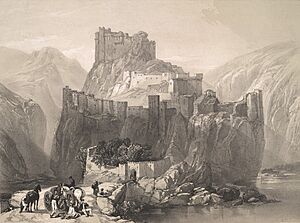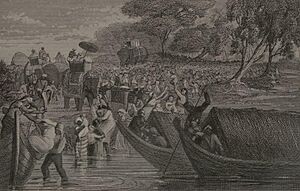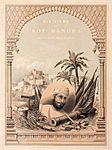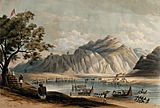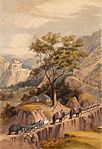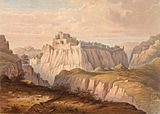Alexander Jack facts for kids
Quick facts for kids
Alexander Jack
|
|
|---|---|
| Born | 19 October 1805 Aberdeen, Scotland |
| Died | 27 June 1857 (aged 51) Cawnpore, India |
| Allegiance | |
| Service/ |
Bengal Army |
| Years of service | 1824–1857 |
| Rank | Brigadier |
| Battles/wars |
|
Alexander Jack (born 19 October 1805 – died 27 June 1857) was a Scottish officer. He served in the Bengal Army for the East India Company. He studied at King's College, Aberdeen in Scotland.
Jack was part of the 30th Bengal Native Infantry. He fought in the Battle of Aliwal during the First Sikh War. Later, he became a brigadier. He was killed during the Indian Mutiny in June 1857 at Cawnpore.
Contents
Early Life and Family
Alexander Jack was born in Aberdeen, Scotland, on 19 October 1805. His grandfather, William Jack, was a minister in Shetland. His father, also named William Jack, was a principal at King's College, Aberdeen.
Alexander was one of four sons. He studied mathematics and philosophy at King's College, Aberdeen from 1820 to 1822. People who knew him remembered him as a tall, handsome young man with a soldierly look.
Military Career
In 1823, Alexander Jack joined the Bengal Army as a cadet. He became an ensign in the 30th Bengal Native Infantry in 1824. Over the years, he rose through the ranks. He became a lieutenant in 1825, a captain in 1832, and a major in 1846.
First Sikh War (1845-1846)
Jack and his battalion fought in the Battle of Aliwal. For his service, he received a medal. He also led a group of soldiers against the town and fort of Kangra in the Punjab. He was praised for his great effort in moving heavy 18-pounder guns. People had suggested leaving the guns behind, but Jack managed to bring them. This march was seen as a great achievement for the Bengal artillery.
Jack also drew some pictures of Kangra. These were later published in a book called Six Sketches of Kot-Kangra.
Second Sikh War (1848-1849)
Jack commanded his battalion during the Second Anglo-Sikh War. He took part in important battles like Chillianwalla and Goojerat. For his bravery, he received another medal with special clasps. He was also made a C.B., which is a special honour.
In 1851, he became a lieutenant-colonel. He was promoted to colonel in 1854. In 1856, he was made a brigadier at Cawnpore. This was an important military base.
Indian Mutiny (1857)
The Indian Mutiny began in Cawnpore on 7 June 1857. Brigadier Jack was with Sir Hugh Wheeler's forces. They defended their camp for several weeks. On 27 June, an agreement was made to evacuate the soldiers by boat. However, during this evacuation, many British soldiers, including Brigadier Jack, were killed.
During the fighting, Alexander Jack's brother, Andrew William Thomas Jack, was also visiting. He was badly injured and died after an operation.
Honours and Awards
 Companion of the Order of the Bath (C.B.)
Companion of the Order of the Bath (C.B.) Sutlej Medal, with a clasp for Aliwal
Sutlej Medal, with a clasp for Aliwal Punjab Medal, with clasps for Chillianwalla and Goojerat
Punjab Medal, with clasps for Chillianwalla and Goojerat
Six Views of Kot-Kangra
-
Crossing the River Beas
 | Shirley Ann Jackson |
 | Garett Morgan |
 | J. Ernest Wilkins Jr. |
 | Elijah McCoy |


